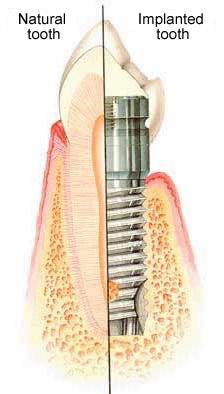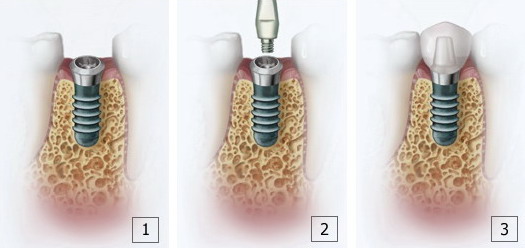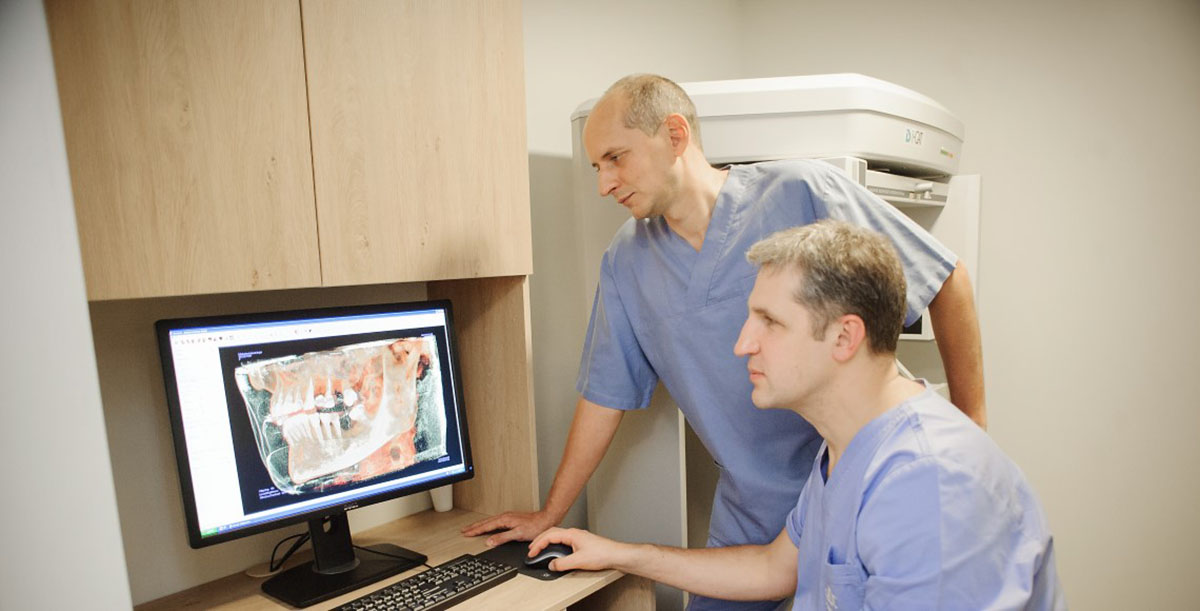
Dental implants is a contemporary approach applied in medicine for more than 30 years, and is used to restore the lost tooth roots. It is the most long-lasting solution to replace one tooth, several teeth or the entire toothless jaw.
A dental implant is a small metal cog made of titanium, which serves as a natural tooth root.
Dental implants are used to replace the missing tooth, several teeth or more.
Regardless of the reason you lost your tooth or several teeth, dental implants will help you to enjoy new, natural teeth once again, as the dental implant, or otherwise a small cog, is screwed into the jaw bone and serves as the real root of the tooth.
When the dental implant naturalizes, it becomes a solid support. Prosthesis then can be mounted on it.
Because the dental implant replaces the natural tooth root, it helps to avoid further own bone loss.
It must be remembered that in order to enjoy your new teeth throughout life, you need to take good care of them: it requires daily oral hygiene and regular visits to a professional oral hygienist.
Advantages of dental implants:
- Preservation of adjacent own tooth;
- Preservation of bone;
- Aesthetics;
- Natural and more beautiful appearance;
- Improved chewing function;
- Long-term solution;
- Better speech;
- Increased self-confidence;
- Beautiful smile;
- Comfort.
Dental implantation procedure:
Before implantation procedure you must make a dental x-ray, to perform an accurate patient analysis, diagnosis and prepare the individual treatment plan designed specifically for your situation. Only in this way the operation can be successful. The dental implant surgery depends on the type of implant and the condition of your jaw. But the entire implant surgery takes place in several stages and may involve a number of procedures. Since this treatment takes time, the process can last several months.
Dental implant surgery is done in three stages:
- First of all, tooth implant is surgically inserted into the bone. As it is performed under local anaesthesia, the patient feels no pain. 7-10 days after implantation of the tooth, it is necessary to remove the sutures, and then the healing process begins. It takes from 1.5 to 4-5 months. During this period, the tooth implant fuses with the bone. The healing period depends on the type of bone, bone condition, implant, and other individual factors.
- After the start of a healing period, the small operation is done to expose the tip of the implant where the oral surgeon affixes a healing head to shape the gums. This period lasts 3-6 weeks.
- Third stage –– prosthesis. The patient is then referred to the dentist – orthopaedist, who continues to produce the crown.

Important:
- Dental implantation is one of the most reliable and most successful operations, its success rate is as high as 98 per cent. It is very unlikely, however it happens that the threaded implants do not adapt for some reason. Statistically, this happens only to 2-3 per cent of patients. You should not be very disappointed about this, because the patient does not feel any pain while the failed implant is removed and after 2-3 months it can be replaced with another.
- But you should keep in mind that for the operation to succeed, it is best that the dental implant surgery is performed by a qualified oral surgeon who has extensive experience in the field.
- Dental implantation is possible after the jaw ceases to grow, it occurs around 16-17 years of age. There are no significant limitations in another age, most importantly, the patient’s general health should be good and stable.
- Dental implants need care as your natural teeth, they require daily oral hygiene, use of dental floss, rinse, and regular visits to a professional oral hygienist, then you will be able to enjoy them for a lifetime.
Dental implant longevity depends on several factors:
- Bone thickness and quality. There must be at least 1.5 mm of bone around the implant.
- There must be fixed gums around the future crown on the implant.
- Individual patient care at the end of treatment has a very significant impact on implant longevity.
- An important factor is the qualifications of the implant surgery doctor, his knowledge, experience, and skills. The implanting physician should have a great experience in this field and good reviews among colleagues and patients. Ideally, the dental implant surgery should be performed by face, oral and maxillofacial surgeons or oral surgeons.
- Another factor is the excellence of prosthetics. If the prosthesis is malformed after the implantation, the biting forces can be distributed unevenly and may result in a shorter implant lifetime.
- For the implants to serve you as long as possible, I recommend to see a hygienist every six months, for professional cleaning of implants. Further, you should visit your doctor – dentist or oral surgeon, who threaded in your implants, every year.
Dental implants will suit you if:
- You have one or more missing teeth;
- You do not want to grind the adjacent teeth to make a bridge prosthesis;
- Jaws finally ceased to grow;
- Sufficient own bone volume (if your bone has melted, it will be necessary to restore it during or before the implantation);
- You need to have healthy oral tissues;
- You cannot or do not want to wear removable dentures;
- You have no serious health problems;
- Want to impress your speech;
Risks
As with any surgery, dental implant surgery may pose certain health risks. However, the problems are very rare, and are usually easily removed.
Risk covers:
- Infection at the implant area;
- Damage to other teeth, gums or vascular injuries;
- Nerve damage, which can cause pain, numbness, or tingling in your natural teeth, gums, lips, and chin;
- Sinus problems.
After surgery
After dental implant surgery, as well as every subsequent operation, you may feel some discomfort:
- Swelling in the face and gums;
- There may be bruising;
- You can feel the pain in the threaded implant area;
- Minor bleeding.
If swelling, discomfort or any other problem is becoming worse in a couple of days after surgery, you should be sure to see your oral surgeon.
After surgery, it is advisable to eat soft food.
Difficult implantation and restorative and maxillofacial surgery
Patients who have lost their natural one or several teeth recently, have no problems during implantation. Patients who have enough own bone, which is not dissolved, have no problem to implant a tooth. However, occasionally there are more serious problems for which it is not possible to perform immediate dental implantation and you will have the new teeth and will be able to enjoy them after a period of time longer than normal.
In order to achieve stable results that ensure the longevity of the implant, it is also important for the patient to have sufficient bone around the implant and fixed gums.
There are cases when the patient’s own bone is insufficient and you can see it only during insertion of the dental implants. The main reason can be periodontal disease, previous tooth extractions and a jaw bone atrophy as a result of trauma.
However, modern medicine is highly advanced, and skilled oral surgeons who specialize and are interested in this area, definitely will find a way out. When the patient’s bone is atrophied or lost, the surgery can return the jaw bone to the same shape and volume, as it was several years ago. However, in such cases, there can be no urgency, everything has to be done correctly and thoroughly.
We take pride in particularly good results and longevity of implants after implantation with bone accretion, after maxillary onlay with bone block and slow bone stretching – distraction osteogenesis – operations which are being performed in the world for just a few years.
It must be remembered that in order to have long term and the best results of treatment with implants, a very close collaboration between the patient and the physician is crucial.
Opting for dental implants, you will feel comfortable, begin to enjoy life with no fear to talk, chat, laugh, kiss and eat.
It is most important to perform proper implantation:
If bone tissue is insufficient, it is necessary to create it, i.e. globally recognized requirements must be met in order to guarantee the normal function of the implant.
This is very important!
Edentulous Jaw Implantation with Straumann Pro Arch Method
Straumann Pro Arch (or All-on-4) method was developed for partly or fully edentulous people to restore all or most teeth saving their time and money.
This insertion method is aiming at partly or fully edentulous people when instead of traditional insertion of 6-8 implants only 4 dental implants with a fixed denture are used.
The aim of Pro Arch implantation is a full-arch restoration at minimal cost, providing a patient with a chance to enjoy restored teeth and changed appearance on the same day.
Also, this method can help to avoid sinus floor lift procedure and bone augmentation or can provide with an opportunity to replace a mobile full-arch denture with a more comfortable fixed one.
How is dental restoration performed with Pro Arch?
Applying Straumann Pro Arch method, during one visit 4 implants are inserted, 2 of which are inserted at 30-45 degree angle in order to provide the ultimate support and maximum stability for the prosthesis.
On the same day new temporary teeth are fixed on the implants which fully restores a chewing function. At the end of the recovery period (recommended 6 months) permanent teeth are fixed.

Straumann Pro Arch method significantly changes an entire course of treatment, shortens the procedure time and reduces the cost of dental repair.
The main advantages of ProArch method:
- Significantly cheaper full-arch restoration compared to the traditional methods.
- Significantly shorter treatment and recovery time.
- Temporary teeth are fixed the same day.
- Stable and comfortable support for different dentures.
- Possibility to implant without additional procedures in case of deteriorated bone.
- Non-removable denture is fixed on implants, which is stable, does not move when speaking or laughing.
- Chewing function is restored.
- After dental restoration the bone receives chewing load which prevents from its deterioration.

